India's Third Giant Leap
This Could be One of the Biggest Opportunities for Investors
- Home
- Views On News
- Jan 12, 2022 - 5 Indian Companies Best Placed to Fight off an Inflation Scare
5 Indian Companies Best Placed to Fight off an Inflation Scare

The Covid-19 pandemic played an integral role in driving up inflation across the world as supply chain disruptions, labour shortages, and abundant liquidity contributed to an unprecedented rally in prices.
How did this impact the stock market?
Companies dependent on raw materials felt the pinch of higher commodity prices, while those selling finished goods or services were impacted due to rising transportation costs and wages.
This impacted their profitability as a result of which some stocks felt the heat.
In fact, some of the top losers of 2021 were companies that had a tough time generating profits as inflation reared its head.
For example, Aurobindo Pharma and Hero MotoCorp shares both fell 21% during the year as their profitability was impacted due to rising commodity costs.
With inflation expected to stick around in 2022, it will be wise to look at stocks of companies that are well placed to hold up against it.
Here are five you can consider.
#1 Kotak Mahindra Bank
First on the list is Kotak Mahindra Bank.
The bank is the third-largest Indian private sector bank by market capitalisation. It offers financial services in the areas of personal finance, investment banking, life insurance, and wealth management.
Kotak Mahindra Bank is well placed with respect to inflation as a lag between lending and deposit costs would help increase interest margins.
In an inflationary environment, lending rates go up first while deposit costs rise with a lag. This bodes well for banks.
The bank has also demonstrated a highly consistent and healthy track record over the years.
Kotak Mahindra Bank's loan book has grown at a CAGR of over 25% over the past decade. This has been supported by a healthy contribution of low-cost deposits (current and savings accounts).
As a result, the bank has sustained very healthy lending margins (NIM). The use of technology has also boosted operating efficiency and has allowed Kotak to grow its profits in line with its balance sheet growth.
In its latest quarterly results, the bank's net interest income (NII) rose 3% YoY while net interest margin (NIM) declined to 4.45% as it changed its loan mix towards lower-yielding assets (HL/wholesale).
The bank has become aggressive in the home loans space for the past few quarters. It has also increased its focus on both the unsecured business and consumer durable financing.
Further, it has made significant investments in technology to revamp its business model and risk models.
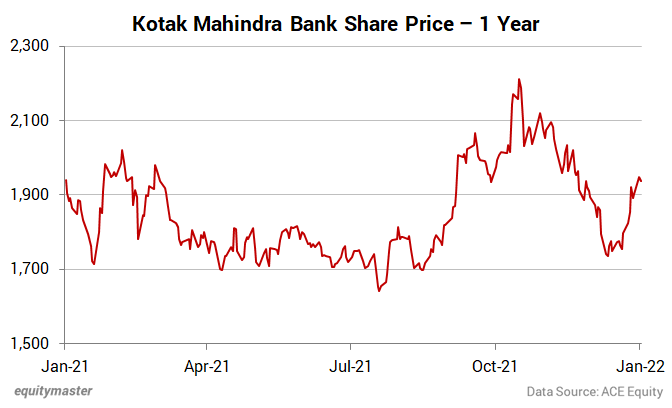
#2 HDFC
The next inflation-proof stock on our list is HDFC.
The company is the largest, among housing finance providers in India. It has also earned the reputation of being a rock-solid financial institution. Not only in India but the world over.
Just like Kotak Mahindra Bank, HDFC stands to benefit from the lag in interest rates. Moreover, its financial performance over the years makes it a stock that one can rely on.
HDFC has grown its loan book at a compounded annual growth rate of 20% in the past decade.
During this period, the entity has consistently maintained net interest margins (NIMs) of over 3% and kept operating expenses under a tight leash.
During the September 2021 quarter, the company's net interest income grew 14% YoY. Net interest margins came in at 3.6%. It also reported a 25% YoY increase in net profit.
Individual loans and disbursements grew by 44% YoY and 23% YoY, respectively, as demand for home loans was strong both in the affordable housing segment as well as in high-end properties.
The company's management has said that it expects to end this year with positive loan growth. The increasing sales momentum and new project launches in the housing sector augur well for it.
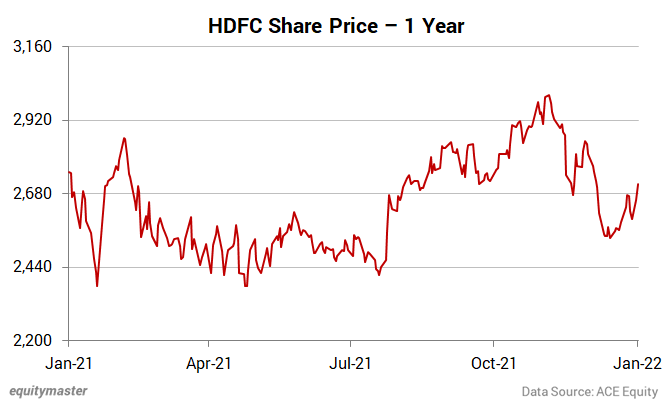
#3 Asian Paints
The third stock on our list is Asian Paints.
The company is the largest paint manufacturer in India and is also in the business of manufacturing of varnishes, enamels or lacquers, thinners etc.
It enjoys a dominant share of over 50% in the organised domestic paints market.
In the decorative paints segment, which comprises about 70-75% of the Indian paints industry, it has a share of about 60%.
The company is one of the best stocks to own during inflation as it has pricing power i.e. the ability to pass on the rise in input costs without affecting demand.
During the September 2021 quarter, the company's net profit dipped 29% YoY as high input costs dented margins. Its operating profit margin narrowed by almost 11% to 12.8%.
To mitigate the impact of this persistently high inflation, the company took a series of price increases. In 2021, it took more than a 20% price hike across products. Despite the price hikes, its revenue increased by 32% YoY.
Going forward, the company's management has said it expects inflationary trends to continue.
It aims to maintain its operating margin within a band of 18-20% through a mix of cost savings and calibrated product price increases to offset input cost rise.
It is looking to improve formulation efficiencies by bringing innovation in technology both in terms of formulation as well as manufacturing.
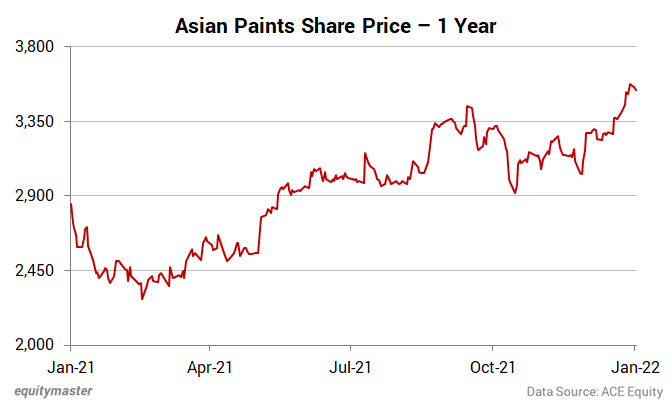
#4 Nestle
The third stock on the list is Nestle India.
The company is a leading player in the Indian FMCG industry and is a subsidiary of Swiss multinational Nestle SA, the world's largest player in the branded and packaged foods industry.
Just like Asian Paints, Nestle has pricing power due to its established market position in the industry.
During the September 2021 quarter, the company's domestic sales grew 13.7% YoY suggesting that it was not badly affected by the second wave.
It also reported a 5% YoY rise in its net profit as it was able to pass the rise in raw material costs.
Unlike many of its industry peers, Nestle was less impacted due to rising input costs as it took price hikes. Although not substantial, Nestle increased prices on some of its packs by 1-3%.
Most FMCG companies, in fact, increased prices, in response to steep increases in commodity, packaging and fuel costs.
The management has said that inflation pressures are likely to be more acute in 2022, with global commodity prices of coffee, milk, oils, and packaging up in high single digits.
It will continue to push price increases through to offset ongoing inflation.
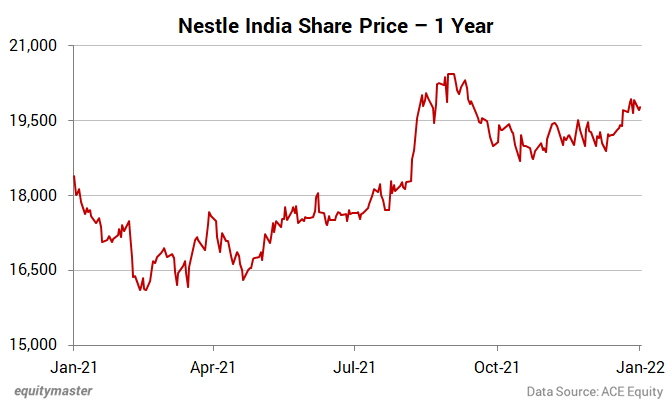
#5 Pidilite
The last stock on our list is Pidilite.
The company is a market leader in adhesive, industrial and construction chemicals, and art materials. It has over 70% market share on account of its brands Fevicol, M Seal, Dr Fixit etc.
In the September 2021 quarter, the company witnessed an unprecedented rise in raw material inflation.
Prices of vinyl acetate monomer, a key input, rose threefold, while supply-chain disruptions added to it. As a result, the company's operating profit margin contracted 6.3% YoY to 20.9%.
The company took calibrated price increases and cost efficiency measures to maintain margins in the range of 20-24%. It expects raw material prices to stay elevated for the next six months.
Despite the price increases, the company has gained market share from unorganised and regional players given its ability to manage processes and supply chain.
It reported a 39.7% YoY increase in revenue for the quarter on the back of strong sales and volume growth across segments and higher realisations. Its net profit rose 5.4% YoY.
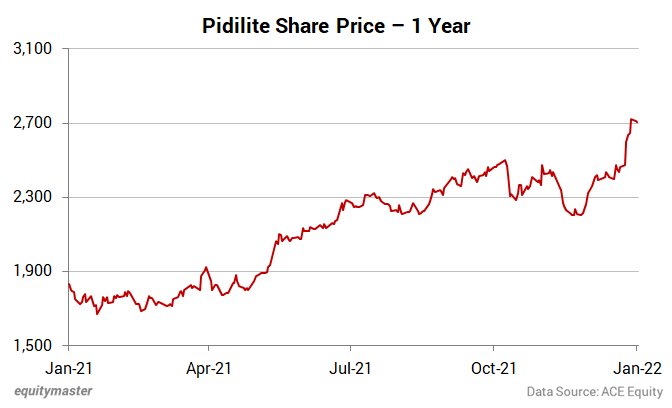
Does Inflation Really Pose a Risk to Your Portfolio?
The general notion about inflation is that people earn less from their investments in real terms i.e. after adjusting for inflation.
People also worry that higher inflation could lead to higher interest rates which could impact the cost of capital for investors.
While this is true, does inflation pose a risk to your portfolio in the long term?
In July 2021, Co-head of research at Equitymaster, Rahul Shah did a study between inflation and the stock market returns to dive deeper into some of these concerns.
We reached out to him to discuss his findings and more. You can read about it here - Does Inflation Really Pose a Risk to Your Portfolio?
You can also check out this video by India's #1 trader, Vijay Bhambwani to know what to invest in during a high inflationary period.
Disclaimer: This article is for information purposes only. It is not a stock recommendation and should not be treated as such. Learn more about our recommendation services here...


Equitymaster requests your view! Post a comment on "5 Indian Companies Best Placed to Fight off an Inflation Scare". Click here!
Comments are moderated by Equitymaster, in accordance with the Terms of Use, and may not appear
on this article until they have been reviewed and deemed appropriate for posting.
In the meantime, you may want to share this article with your friends!